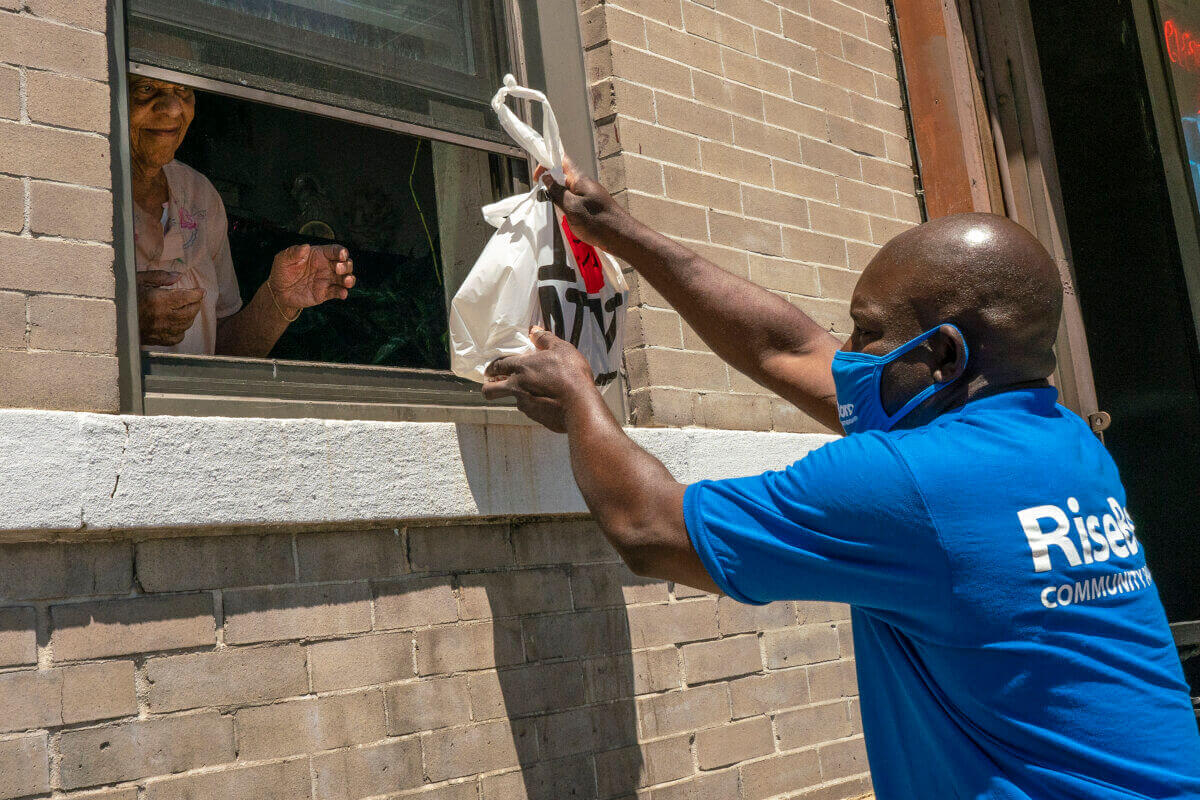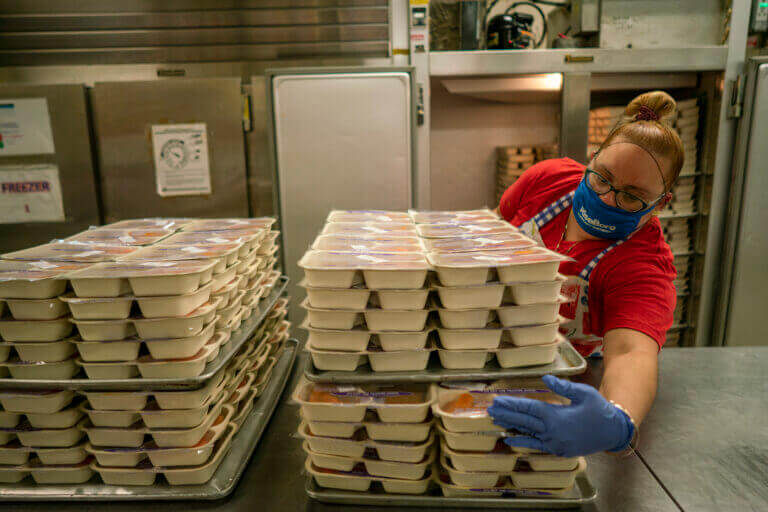Inflation, Rising Food Costs Slam CityMeals on Wheels and Its Clients
With the end of Covid-era SNAP benefits earlier this month, CityMeals is preparing for additional pressure on its service that is mostly reliant on private funding to currently feed 20,000 New Yorkers.

CityMeals, which provides fresh, hot meals to New Yorkers in need, is struggling in the face of rising food prices and higher demand for the service. Photo by Jake Price/CityMeals
For Brooklynites like Susan Robulus, a warm meal delivered daily by CityMeals on Wheels is a lifeline as she grapples with caring for her mother amid the cost of living crisis and declining health.
“How would I be able to survive? How would I eat? How would I feed my mom?” Robulus said during a recent CityMeals delivery to her home in Williamsburg Gardens.
Inflation and rising grocery prices have meant many have had to adapt their grocery budget accordingly, and with food prices expected to rise another 7.5 percent this year, per the Department of Agriculture, lower-income households are facing continued uncertainty.
A recent survey by Opinium found that 10 percent of New Yorkers are struggling to afford basic necessities such as food, rent, or medical care, while one-third of respondents said they can afford basic wants and needs but have to be careful about what they spend their money on.

Robulus, 59, has stage three emphysema and is dependent on three liters of oxygen to get her through the day. The weight of the tanks means she cannot venture far from her home. The reliance on oxygen also means that she can’t use a stove to prepare meals for herself and her 78-year-old mother, Carmen, who is a wheelchair user.
The pair “make do” with microwave-friendly food items to tide them over between City Meal deliveries, Robulus said, but the cost has gotten “horribly expensive” and “it’s very hard to find things to make a decent meal.”
“It’s not affordable to live anymore without help,” said Robulus. “Everything is triple the price or it is rotten or no good. With my Meals on Wheels I’m safe, I know I’m getting a nutritious meal. I don’t know what I would do without my meals, I wouldn’t be able to survive.”

Robulus and her family have been receiving help from CityMeals since the start of the pandemic — part of the 10 percent overall increase in recipients that City Meals has taken on since 2020.
But with the end of Covid-era SNAP benefits earlier this month, the organization is preparing for additional pressure on its service that is mostly reliant on private funding to currently feed 20,000 New Yorkers. An estimated 14 percent of the people City Meals serves are living on one meal a day, according to the organization.
At the height of the pandemic, the number of people using CityMeals’ service ballooned “exponentially” to 50,000 people as it provided emergency meals to additional senior housing groups across the city.
“We do anticipate seeing the numbers grow in the coming months as these various pandemic era meal programs come to an end and people may find themselves more interested in home delivered meals,” CityMeals CEO Beth Shapiro told Brooklyn Paper. “There are a lot of older people who might have been mobile and able to shop and cook before the pandemic. But two years of isolation had a negative effect on a lot of older people. Many of them did not become more able to meet their needs during that time, they became less able to.”
The organization must anticipate that growth in users and budget for increasing costs, Shapiro said, since it doesn’t seem like the cost of food is going to come down any time soon.
“And the vast majority of the CityMeals on Wheels’ budget is from the general public, average New Yorkers who make donations to support our work. And so as the number of meal recipients grows, we have to double down on fundraising,” she said.
The weekday meals delivered to recipients like Susan and Carmen come from Risboro Community Partnership and are funded by the Department of Aging. CityMeals steps in to fill that gap of weekends, holidays, and in times of emergency.

The organization estimates the gap it fills equates to about two million meals a year, or about 40 percent of all meals delivered. The service is primarily funded by the private sector — individuals and foundations — with just 12 percent of its $32 million budget coming from the city.
CityMeals is expecting to register a $3 million budget deficit at the end of its fiscal year in June. If more funding cannot be found, Shapiro said, she may have to “figure out how to do more with less” with the worst-case scenario being cutting programs.
“So, the need for our fundraising to increase is significant on the private sector, as well as from the government whether it’s city, state, or federal. But all our funding to date has come from the city, we really don’t go after state or federal funding but we’re starting to because of this need,” she added. “We’re feeding people who built the city for us. And to me, it’s our responsibility to make sure they have food to stay in their homes in the communities they want to live in.”
Editor’s note: A version of this story originally ran in Brooklyn Paper. Click here to see the original story.
Related Stories
- Bushwick Flower Stalls Create Hubs of Peace, Small Business Opportunities for Local Immigrants
- Empty Lot Used as Dumping Ground Turned Into Community Garden on Stockholm in Bushwick
- Brownsville NYCHA Complex Chosen for Con Edison E-Bike Charging Station Pilot Program
Email tips@brownstoner.com with further comments, questions or tips. Follow Brownstoner on Twitter and Instagram, and like us on Facebook.









What's Your Take? Leave a Comment